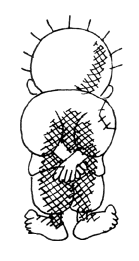
August/September 2005
Naji al-Ali and Handala: In Memoriam
Naji Al-Ali was born in 1936 in the Palestinian village of Ash Shajara. In 1948, Ash Shajara was one of the 480 villages destroyed in what is known as the "Nakba," or catastrophe. The Nakba is the devastation of Palestine in the creation of the Israeli state: The Palestinians lost more than half of their land, massacres took place and 750,000 refugees were created. Naji Al-Ali was 10 years old when he and his family were expelled from Palestine to Ein Al-Hilweh refugee camp in Lebanon.
Naji Al-Ali grew up to become perhaps the most popular cartoonist in the Arab world. With brutal honesty, Naji Al-Ali analyzed the relationships between the governments of the United States, Israel and the Arab regimes and the ramifications for the Palestinians. Time Magazine described him saying, "This man draws with human bones." The Asahi Newspaper, in Japan, once wrote, "Naji Al-Ali draws using phosphoric acid."
Naji Al-Ali was well loved for his work but was also well hated, as illustrated by the many death threats he and his family received. On July 22, 1987, in London, Naji Al-Ali was assassinated as he walked towards the offices of Al-Qabas newspaper. He died in the hospital on August 29th. His murderer has never been apprehended.
Naji Al-Ali was killed as the Intifada in the West Bank and Gaza Strip was beginning. To this day, Naji Al-Ali's searing cartoons, seen through the eyes of the refugee boy named Handala, continue to be used over and over again.
Naji Al-Ali was one of the most prominent cartoonists in the Arab world. Sarcastic, poignant and perhaps too bold, El Ali's cartoons were drawn from his experience as a Palestinian refugee since childhood and clearly reflected his political stance, which was often critical of the Arab regimes. The following extracts are drawn from an interview with Radwa Ashour, novelist and professor of English literature at Ain Shams University, during the summer of 1984 in Budapest, Hungary. It was published in the periodical Al Muwagaha in 1985, only two years before El-Ali was assassinated in London in 1987 at the age of 50.

|
From approximately 1975 through 1987 Naji Al-Ali created cartoons that depict the complexities of the plight of Palestinian refugees. These cartoons are still relevant today and Handala, the refugee child who is present in every cartoon, remains a potent symbol of the struggle of the Palestinian people for justice and self-determination.
Naji Al-Ali wrote: "The child Handala is my signature, everyone asks me about him wherever I go. I gave birth to this child in the Gulf and I presented him to the people. His name is Handala and he has promised the people that he will remain true to himself. I drew him as a child who is not beautiful; his hair is like the hair of a hedgehog who uses his thorns as a weapon. Handala is not a fat, happy, relaxed, or pampered child. He is barefooted like the refugee camp children, and he is an icon that protects me from making mistakes. Even though he is rough, he smells of amber. His hands are clasped behind his back as a sign of rejection at a time when solutions are presented to us the American way.
Handala was born ten years old, and he will always be ten years old. At that age, I left my homeland, and when he returns, Handala will still be ten, and then he will start growing up. The laws of nature do not apply to him. He is unique. Things will become normal again when the homeland returns.
I presented him to the poor and named him Handala as a symbol of bitterness. At first, he was a Palestinian child, but his consciousness developed to have a national and then a global and human horizon. He is a simple yet tough child, and this is why people adopted him and felt that he represents their consciousness."
Contact us: Al-Awda Newspaper
(973) 954-2521
info@newjerseysolidarity.org
http://www.newjerseysolidarity.org
New Jersey Solidarity
344 Grove Street, Suite 131
Jersey City, NJ 07302
Our editorial collective is responsible for editing, laying out and developing this publication. We are open to new members who are in accord with the mission and principles of this newspaper.
Please contact us about your upcoming events and activities of interest to readers of this publication.
Please contact us for advertising rates and information, or for material on becoming a distributor.